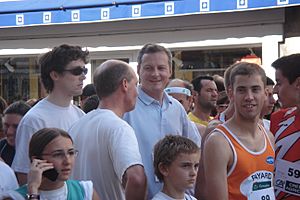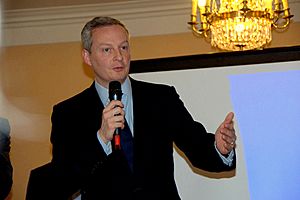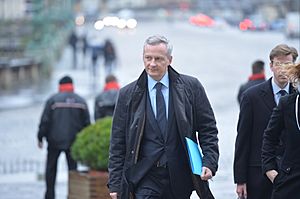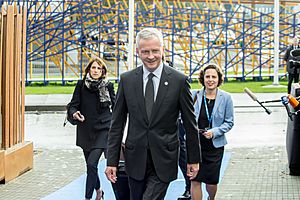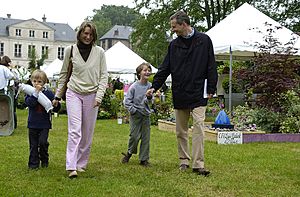Bruno Le Maire facts for kids
Quick facts for kids
Bruno Le Maire
|
|
|---|---|
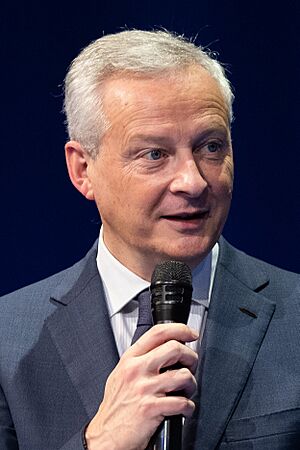
Le Maire in 2022
|
|
| Minister of the Economy, Finance, Industrial and Digital Sovereignty | |
| In office 17 May 2017 – 21 September 2024 |
|
| Prime Minister | Édouard Philippe Jean Castex Élisabeth Borne Gabriel Attal |
| Preceded by | Michel Sapin |
| Succeeded by | Antoine Armand |
| Minister of Food, Agriculture and Fishing | |
| In office 23 June 2009 – 15 May 2012 |
|
| Prime Minister | François Fillon |
| Preceded by | Michel Barnier |
| Succeeded by | Stéphane Le Foll |
| Secretary of State for European Affairs | |
| In office 18 December 2008 – 23 June 2009 |
|
| Prime Minister | François Fillon |
| Preceded by | Jean-Pierre Jouyet |
| Succeeded by | Pierre Lellouche |
| Member of the National Assembly for Eure's 1st constituency |
|
| In office 21 June 2017 – 21 July 2017 |
|
| Preceded by | Guy Lefrand |
| Succeeded by | Séverine Gipson |
| In office 20 June 2012 – 17 June 2017 |
|
| Preceded by | Guy Lefrand |
| Succeeded by | Guy Lefrand |
| In office 20 June 2007 – 13 January 2009 |
|
| Preceded by | Françoise Charpentier |
| Succeeded by | Guy Lefrand |
| Personal details | |
| Born | 15 April 1969 Neuilly-sur-Seine, France |
| Political party | Renaissance (since 2017) |
| Other political affiliations |
UMP (before 2015) LR (2015–2017) |
| Spouse |
Pauline Doussau de Bazignan
(m. 1998) |
| Children | 4 |
| Education | Lycée Louis-le-Grand |
| Alma mater | École normale supérieure Université Paris-Sorbonne Sciences Po École nationale d'administration |
| Signature |  |
Bruno Le Maire (born 15 April 1969) is a French politician and writer. He served as the Minister of the Economy and Finance from 2017 to 2024. He worked under President Emmanuel Macron.
Before this, he was a member of The Republicans political party. In 2017, he joined La République En Marche! (LREM). He also served as Secretary of State for European Affairs from 2008 to 2009. From 2009 to 2012, he was the Minister of Food, Agriculture and Fishing. This was during the time of President Nicolas Sarkozy. Bruno Le Maire is also a well-known author. His book Des hommes d'État won an award in 2008.
Contents
Early Life and Education
Bruno Le Maire was born on 15 April 1969 in Neuilly-sur-Seine, France. His father, Maurice Le Maire, was an executive at an oil company. His mother, Viviane Fradin de Belâbre, was a headmistress at private Catholic schools.
Bruno Le Maire attended Lycée Saint-Louis-de-Gonzague. After that, he went to some of France's most famous schools. In 1989, he started at the École normale supérieure. He also studied French literature at Paris-Sorbonne University. In 1995, he graduated from Sciences Po. Then, in 1996, he was accepted into the École nationale d'administration (ÉNA). These schools are known for training people for high-level government jobs.
Bruno Le Maire is married to Pauline Doussau de Bazignan, who is a painter. They have four sons together. His wife worked as his assistant in parliament from 2007 to 2013. Le Maire can speak French, English, Italian, and German very well.
Political Career
Starting in Government
After finishing his studies at ÉNA in 1998, Bruno Le Maire began working in the Ministry of Foreign Affairs. He later joined the team helping the Secretary General of the President's Office. In 2002, he became an advisor for foreign affairs. Then, in 2004, he became an advisor in the Interior Ministry.
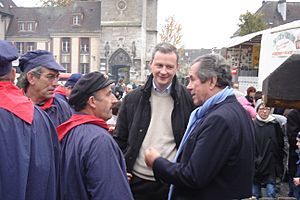
After several roles, Le Maire became a political advisor to the Prime Minister. In July 2006, he was made the Chief of Staff for the Prime Minister. He stayed in this role until the Prime Minister left office.
From 2007 to 2008, he was a member of the National Assembly of France. He represented a part of the Eure region. In December 2008, he was appointed Secretary of State for European Affairs. He held this position until 2009.
Since 2008, Le Maire has also been a political advisor for the UMP party. He also serves as a council member in the city of Évreux.
Minister of Agriculture and Fishing (2009–2012)
In June 2009, Bruno Le Maire became the Minister of Food, Agriculture and Fishing. This was part of the government led by François Fillon. During his time as minister, he worked to update French agriculture, food, and fishing rules.
He also hosted the G20 Agriculture summit in 2011. This meeting led to the creation of AMIS (Agricultural Market Information System). AMIS helps keep an eye on the global agricultural market. It can also call for special meetings if needed.
Running for Leadership
In August 2012, Le Maire announced he would run for the leader of the Union for a Popular Movement party. He wanted to bring new ideas and focus on four main points:
- Making Europe's economy work better together.
- Making French businesses and economy stronger.
- Bringing back values like respect and authority in society.
- Bringing new, younger people into political parties.
He did not get enough support to run that time. In November 2014, he ran for the leadership of The Republicans party (formerly UMP). He received 29.8% of the votes, while Nicolas Sarkozy won.
Le Maire was seen as a strong candidate for the 2016 center-right primary election. However, he only received 2.4% of the votes. He then became a spokesperson for the party's candidate, François Fillon. But he resigned when Fillon faced a financial scandal. Le Maire later said that his party should work with President Macron. He believed this would help Macron succeed and prevent extreme right-wing parties from gaining more power.
On 17 May 2017, The Republicans party announced that anyone from their party who joined the government was no longer a member. This included Bruno Le Maire.
Minister of the Economy and Finance (2017–2024)
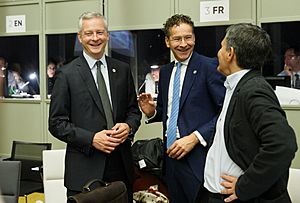
In May 2017, President Emmanuel Macron appointed Le Maire as the Minister of the Economy. He worked with Budget Minister Gerald Darmanin. Soon after, Le Maire joined the La République En Marche! party. He won reelection in his local area, beating the National Front candidate. On 19 June 2017, he was appointed Minister of the Economy and Finance.
In November 2017, Le Maire considered running to become the next President of the Eurogroup. This role was eventually given to Mário Centeno from Portugal. In 2019, he helped choose a European candidate to lead the International Monetary Fund.
On 5 June 2022, Le Maire stated that France was talking with the United Arab Emirates. They wanted to replace some oil imports from Russia.
In September 2023, Le Maire attended a meeting of the German government. In October 2023, he took part in a joint meeting of the German and French governments.
On 21 September 2024, Antoine Armand replaced him as economy and finance minister. This ended Le Maire's seven-year and four-month time in the role.
Other Activities
Bruno Le Maire has been involved in several important organizations:
European Union Organizations
- European Investment Bank (EIB): He is a member of the Board of Governors.
- European Stability Mechanism (ESM): He is a member of the Board of Governors.
International Organizations
- Asian Development Bank (ADB): He is a member of the Board of Governors.
- Asian Infrastructure Investment Bank (AIIB): He is a member of the Board of Governors.
- European Bank for Reconstruction and Development (EBRD): He is a member of the Board of Governors.
- Inter-American Investment Corporation (IIC): He is a member of the Board of Governors.
- International Monetary Fund (IMF): He is a member of the Board of Governors.
- Joint World Bank-IMF Development Committee: He is a member.
- Multilateral Investment Guarantee Agency (MIGA), World Bank Group: He is a member of the Board of Governors.
- World Bank: He is a member of the Board of Governors.
Political Views
Domestic Policy
During the 2016 conservative primary elections, Le Maire took a strong stance on law and order. He also spoke about national identity. He called for quickly removing foreigners who were seen as a risk by security services. He also wanted to deport foreign nationals after they finished jail terms. He also suggested limiting the number of refugees.
Economic Policy
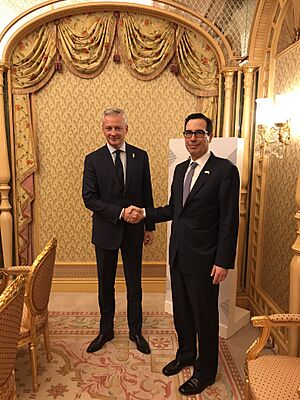
Le Maire supports a free-market economy. He has suggested privatizing France's job centers. He also wants to end government-supported jobs and limit welfare benefits. As minister, he worked to reduce government control over the economy. He also oversaw efforts to privatize airports and other state-owned companies.
In 2016, Le Maire said that Britain leaving the European Union (Brexit) was a "great chance for France." He believed it would remove the main supporter of less regulation in the EU. On 9 July 2017, he promised to create a plan to protect French companies from foreign takeovers.
Regarding foreign trade, Le Maire was against the Transatlantic Trade and Investment Partnership (TTIP). He also argued for trade policies that protect French businesses. This would help defend against unfair pricing from countries like China.
In August 2017, Le Maire urged EU nations to work harder on taxing the digital economy. He said a "new push" was needed to get a fairer contribution from digital companies. This came after a report showed that Airbnb paid very little in taxes in France in 2016. He called these low tax payments "unacceptable."
During the COVID-19 pandemic, Le Maire and his German colleague Olaf Scholz played a key role. They helped overcome resistance from other countries. They secured a 500 billion euro emergency deal for the EU. This deal provided financial help to workers, companies, and governments struggling because of the virus.
In July 2020, Le Maire announced that the French government would cut taxes for French companies. These taxes are paid in addition to normal corporate income tax. The cut would be 20 million euros over the next two years.
Brexit Views
On 20 July 2017, Le Maire stated that the United Kingdom still owed the EU budget €100 billion after Brexit. Other European leaders shared this view. He also promised to set up a special court for financial contracts under English law after Brexit.
Speaking to the BBC in January 2019, Le Maire said the Brexit withdrawal agreement could not be changed. He said it was up to the UK to find a solution. He also warned that a "no-deal Brexit" would be "catastrophic" for the UK.
Foreign Policy
In foreign policy, Le Maire supports traditional Gaullism. This means he favors France's national independence. He has called for a stronger European defense policy. This would help secure the EU's borders and fight terrorism. He also believes Germany should spend more on its military.
In February 2019, Le Maire criticized Germany's ban on selling weapons to Saudi Arabia. He said it was pointless to make weapons together if they couldn't be exported. Germany had imposed the ban after the killing of a Saudi journalist. They also had concerns about human rights in the Saudi Arabian–led intervention in Yemen.
On 1 March 2022, Le Maire warned that the EU would "cause the collapse" of the Russian economy. He said France rejected Russia's demand for foreign buyers to pay in rubles for Russian gas. He added that they were preparing for a situation where there would be "no longer any Russian gas."
Personal Life
Bruno Le Maire is married to Pauline Doussau de Bazignan. They have four children. Their family has a holiday home in Saint-Pée-sur-Nivelle.
Film Appearances
Bruno Le Maire has appeared in two films:
- In the 2011 movie La Conquête (The Conquest), which was about Nicolas Sarkozy's career, he was played by Emmanuel Noblet.
- He also made a brief appearance as himself in Bertrand Tavernier's 2013 film The French Minister.
Honors and Awards
French Honors
 France: Commander of the Ordre du Mérite Maritime (2009)
France: Commander of the Ordre du Mérite Maritime (2009) France: Commander of the Ordre du Mérite Agricole (as Minister of Agriculture)
France: Commander of the Ordre du Mérite Agricole (as Minister of Agriculture)
Foreign Honors
 Denmark: Commander 1st Class of the Order of the Dannebrog (2018)
Denmark: Commander 1st Class of the Order of the Dannebrog (2018) Germany: Knight Commander of the Order of Merit of the Federal Republic of Germany (2022)
Germany: Knight Commander of the Order of Merit of the Federal Republic of Germany (2022) Senegal: Commander of the National Order of the Lion (2019)
Senegal: Commander of the National Order of the Lion (2019)
Other Awards
- "Humor and Politics Prize" awarded by the Press Club of France (2016)
See also
 In Spanish: Bruno Le Maire para niños
In Spanish: Bruno Le Maire para niños
 | Anna J. Cooper |
 | Mary McLeod Bethune |
 | Lillie Mae Bradford |


